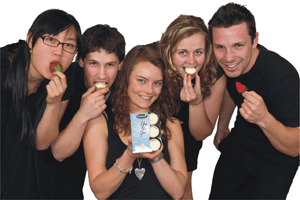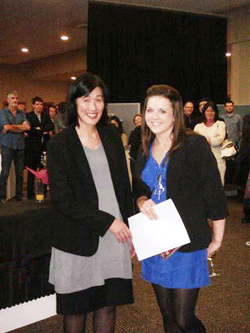By Les Watkins
Food producers interested in improving or expanding their range could find it worth their while to consider research being undertaken at Massey University.
A surprisingly diverse selection of innovative concepts and projects were on display during the Food Technology degree awards at the Massey University Albany campus late last year – including some which benefitted from the cooperation or sponsorship of major players in the industry.
Technology courses were established at Massey more than 50 years ago and, as associate professor Marie Wong points out, the launch of an improved Bachelor of Food programme will help make 2012 a significant year for the university.
Professor Wong is regional director of the Institute of Food, Nutrition and Human Health and she adds that Massey puts great emphasis on the value of creativity – a fact evidenced by the range of projects undertaken.
Singaporean Phua Zhen Hua, for instance, recognised that limited shelf life presents a problem for apple exporters.
“There is a huge demand in Singapore for fresh fruit as consumers have an increasing preference for convenience foods,” she says.
But after about three days apples show defects such as browning, softening and moisture loss which affects the texture.
Ms Phua beat the moisture-loss difficulty by covering apples with polysaccharide coatings. However, those apple jackets are poor oxygen barriers and do not retard browning. Further work was undertaken to crack that problem.
A similar problem with a different food was solved by Anton Delaney. He developed a method for ensuring a satisfactory shelf-life of about 60 days for a chilled vegetable-layered vegetable meal which included couscous.
It involves cooking and packaging the product at cool temperatures before steam flushing to reduce microbial load. The growth of any remaining micro-organisms is then prevented by gas-packing.
A project designed to show customers the most favourable face of an apple was completed by mechatronics graduate Campbell Sharp.
His device presents the fruit with the sunniest red side upwards.
This involves the apples riding on a jockey along a conveyor which has a differential roller.
“The apple spirals under a line of cameras,” explains Mr Sharp.
“When the apple is in the correct orientation the roller is stopped from turning.”
The goal for Janice Lim was a tasty zero-fat ice-cream.
Most of these products, she says, lack creaminess and the ability to carry fatsoluble flavours.
She found the solution in starchmonoglyceride complexes. The result: a high-quality frozen dessert with good melt-down and mouth-feel.
Possibly the most unexpected project was that undertaken by Bartholomew Su – producing birthday cakes for dogs.
“It is an anthropomorphic extrapolation to assume the dog understands the importance of the day,” he says.
“However, a birthday cake will create an opportunity to remember why dogs are so important in our own lives.”
He adds that his cake will be a first for New Zealand and should soon be on offer in supermarkets and at vet clinics.
For more information:
Professor Marie Wong
Email: [email protected]
Tel: 09 414 0800 ext 41204





























































































